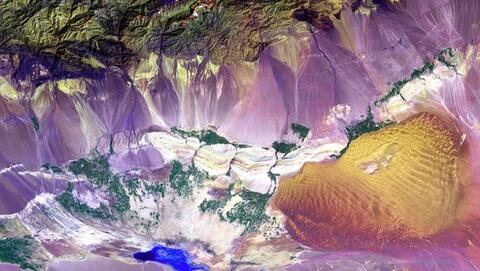
Master 2 courses in Earth and Planetary Sciences, Environment - Geosciences-Planetology (GEO-P) track
The GEO-P track focuses on the understanding of earth and planetary systems. Within the Master in Earth and Planetary Sciences, Environment, the disciplinary teaching of the typical courses begins in the first year of the Master. The second year is made up of options that allow students to specialise in geosciences and/or planetology research themes.
Courses Taught in English - GEO-P track
Semester 1
2nd year Master - 1st Semester - 9 ECTS - English Level: B2 (no test required)
Brief Description
- 14 days of fieldwork in the Betic Cordilleras (Spain) or in the Cyclades (Greece)
- Marine geophysics training in Villefranche-sur-Mer (France)
Contact
Damien DO COUTO (damien.do_couto@sorbonne-universite.fr)
2nd year Master - 1st Semester - 6 ECTS - English Level: B2 (no test required)
Brief Description
Processes (tectonic, sedimentary, petrological) governing the formation and evolution of different types of margins and orogens.
1- Integrated multidisciplinary land-sea study of passive non-volcanic margins with the example of the Gulf of Lion (sedimentary and structural architecture, thermicity, emplacement and evolution processes, objects associated with their dynamics such as gravity slides).
2- Successive stages of evolution of an orogen: subduction (deep structures, interface dynamics, associated magmatism and metamorphism), collision (deep structures and rheology, exhumation and relief building processes, structural styles and mechanics of frictional prisms, foreland basins, mantle processes), and post-orogenic evolution.
Prerequisites
Basics on stresses, tectonic structures, quantification and mechanisms of brittle and ductile deformation, kinematics, rheological behaviors, structure, rheology and thermicity of the lithosphere. Basics of magmatic and metamorphic petrology.
Basics of sedimentology, sequence stratigraphy, geophysical imaging.
Contact
Elia D’ACREMONT (elia.d_acremont@sorbonne-universite.fr)
Olivier LACOMBE (olivier.lacombe@sorbonne-universite.fr)
2nd year Master - 1st Semester - 3 ECTS - English Level: B2 (no test required)
Brief Description
- The Cenomanian-Turonian boundary oceanic anoxic event: an integrated approach.
- Sedimentological and geochemical evidence of oceanic acidification at PETM (ca. 55 M years).
- Neogene climate evolution in the East African Rift using stable isotopes of fossil remains.
- Paleocene: a key period in the climatic and oceanographic history of the Earth.
- Climate changes in European basins during the Paleogene.
Contact
Laurent EMMANEUL (laurent.emmanuel@sorbonne-universite.fr)
2nd year Master - 1st Semester - 3 ECTS - English Level: B2 (no test required)
Brief Description
The sequence of lectures allows for a progressive change of scale, from the thermochemical nature of geological fluids to their effect on rocks at the scale of subduction zones.
During this module, students will acquire fundamental notions on fluid-rock interactions and their consequences on deformation, as well as practical experience in fluid analysis techniques (in the lab).
They will also have to conduct an in-depth personal reflection on a specific topic (paper presentation).
Prerequisites
Good knowledge of magmatic and metamorphic petrology, geochemistry, deformation and rheology.
Contact
Anne VERLAGUET (anne.verlaguet@sorbonne-universite.fr)
2nd year Master - 1st Semester - 3 ECTS - English Level: B2 (no test required)
Brief Description
- Characterization of petroleum source rocks
- Reservoir characterization
- Generation and expulsion
- Unconventional oil resources
- Modeling of petroleum systems
Prerequisites
- Basics of organic geochemistry
- Basics of petroleum systems
Contact
François BAUDIN (francois.baudin@sorbonne-universite.fr)
2nd year Master - 1st Semester - 3 ECTS - English Level: B2 (no test required)
Brief Description
Knowledge and modeling of continental deformation and its significance in terms of lithospheric rheology and dynamics:
- brittle and ductile processes
- seismic and asismic processes
- modes and mechanisms of rupture
- earthquakes
- rheological behavior and mechanisms of deformation at different time scales
- deformation localization processes
Contact
Frédérique ROLANDONE (frederique.rolandone@sorbonne-universite.fr)
2nd year Master - 1st Semester - 3 ECTS - English Level: B2 (no test required)
Brief Description
The skills acquired are in the field of mineralogy, pyrometallurgy and analysis (use of several types of SEM).
This course gives a very concrete idea of the jobs of geologists related to the processing and management of natural resources and their environmental impact.
It is offered in part by actors from the socio-economic world, who know the skills sought by potential employers.
Prerequisites
Underground energy and mineral resources course
Contact
Loïc LABROUSSE (loic.labrousse@sorbonne-universite.fr)
2nd year Master - 1st Semester - 3 ECTS - English Level: B2 (no test required)
Brief Description
Stratigraphy of terrigenous and carbonate sedimentary series at the basin scale.
Interpretation of depositional environments from 3D seismic geomorphic data (reservoir scale).
Application of reservoir geology in different contexts (petroleum, new energies, storage).
Prerequisites
- Stratigraphy
- Geophysics
- Sedimentology of facies
Contact
Damien DO COUTO (damien.do_couto@sorbonne-universite.fr)
2nd year Master - 1st Semester - 3 ECTS - English Level: B2 (no test required)
Brief Description
Subjects at the heart of current research and/or societal issues, they vary each year.
Contact
Damien DO COUTO (damien.do_couto@sorbonne-universite.fr)
Anne VERLAGUET (anne.verlaguet@sorbonne-universite.fr)
